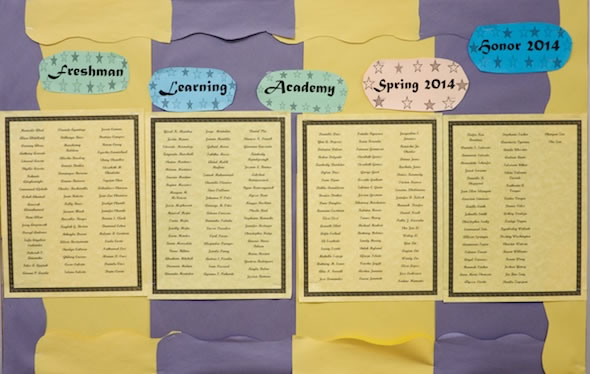
The Borough of Manhattan Community College’s Freshman Learning Academy, or FLA, has won a $115,000 grant from The New York Community Trust, or NYCT. It’s the third grant the New York City non-profit foundation has awarded BMCC’s three-year-old Learning Academy. The latest gift will allow the intensive “hands-on approach” program to retain students for three years versus the one-year they stay in the program now.
BMCC Development team member Brian Haller spearheaded the latest grant proposal to the Trust. He said NYCT, especially its director for Children, Youth and Families, Patricia White, has been supportive of BMCC efforts to develop learning academies such as FLA.
“The ‘Trust’ appreciates the kind of structure and organization a program such as the FLA brings to students and the impact it can have on student’s education,” Haller said.
Connecting students to advisors and each other
The BMCC Freshman Learning Academy’s overall mission is to support select first-year liberal arts majors by helping them transition into college life and explore academic choices. The Academy does this by connecting those students with faculty mentors as well as students who have similar interests.
“We train our faculty to create high-impact activities, or best educational practices,” said Alexandra Pyak, director at FLA.
At registration, students choose from a selection of reserved courses. FLA also provides financial aid assistance and academic support, as well as time management and other support.
“Student advisors serve as a liaison between faculty and students,” said Pyak.
Building critical thinking skills
Students are recruited in a process that requires them to sign up for a full-time course load. Pyak says somebody straight out of high school that might be undecided about a major or unmotivated academically is ideal for the program.
They can be enrolled in two to three developmental classes, although reading and writing levels are required to be at a slightly higher level.
“The higher reading and writing level requirement is because the program’s paired courses require a certain level of comprehension,” she said.
Data shows smaller groups and hands-on approach works
So far, FLA data show a significant positive impact. Semester retention levels for the Fall 2013 to Spring 2014 FLA cohort stood at 93.2%. And, FLA full-year retention levels from Fall 2013 through Fall 2014 were 73.8%.
But, once students exit the program, the numbers and performance measures appear to change.
In fact, data show that after only one year of the individualized oversight, overall retention levels sink back down to average levels that hover around 60 percent once exiting the program, according to Pyak.
“We started digging deeper and trying to find out why we aren’t sustaining retention in the long term,’’ said Pyak.
So, she said FLA staff began looking at the Accelerated Study in Associates Program, or ASAP, and other similar models that group students into cohorts, monitoring them from admission to graduation.
Specifically, the research from the Lumina Foundation’s Achieving the Dream: Community Colleges Count initiative coupled with data from the ASAP and the Out-in Two and College Discovery Programs, all support the conclusion that dedicated advising and integrated college support services must be sustained over two, and even three years to truly impact community college student persistence and graduation rates over the long term.
Put more simply, FLA began to realize that many students in the program take longer periods of time to develop critical thinking skills as well as the necessary practical skills to self navigate the often overwhelming academic system.
“With this new grant, depending on a particular student’s goals, a program expansion means hopefully, we can take them from the point of admission, to the second or third year point of graduation, or transfer to another institution,” said Pyak.
She says a lot of schools are beginning to recognize the value of customized entry-level academics coupled with the additional specialized attention to students.
By this fall 2015, 1,500 BMCC students will have passed through the program.
STORY HIGHLIGHTS
- Latest New York Community Trust grant allows programto expand to three years.

